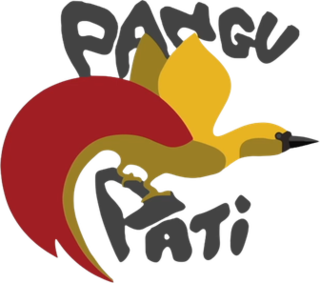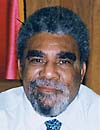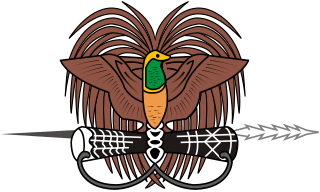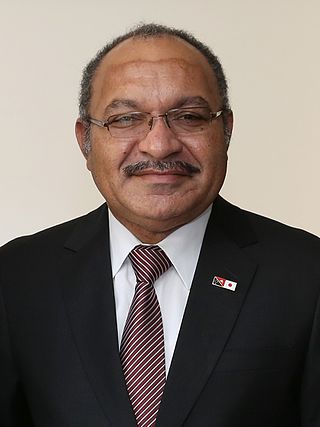Related Research Articles

The politics of Papua New Guinea takes place in a framework of a parliamentary representative democratic multi-party system, whereby the prime minister is the head of government. Papua New Guinea is an independent Commonwealth realm, with the monarch serving as head of state and a governor-general, nominated by the National Parliament, serving as their representative. Executive power is exercised by the government. Legislative power is vested in both the government and parliament.

The Pangu Pati, officially Papua na Niugini Yunion Pati, is a nationalist and developmentalist political party on the centre-left in Papua New Guinea. The party is the oldest political party in Papua New Guinea and has held all levels of government throughout its history. As of 2023, it is the largest party in the National Parliament.
Jeffery Nape was, until the 2012 election, speaker of the National Parliament and twice officially and once unofficially acting governor-general of Papua New Guinea. He was elected speaker by the members of the parliament on 28 May 2004, and then immediately became acting governor-general because that office was substantively vacant. He succeeded Bill Skate in both roles.

Sir Mekere Morauta was a Papua New Guinean politician and economist who served as the 7th Prime Minister of Papua New Guinea from 1999 to 2002. Inheriting a depressed economy and a fractious legislature, he embarked on fundamental reforms of the country's economy and political system.

Sir Michael Thomas Somare was a Papua New Guinean politician. Widely called the "father of the nation", he was the first Prime Minister after independence. At the time of his death, Somare was also the longest-serving prime minister, having been in office for 17 years over three separate terms: from 1975 to 1980; from 1982 to 1985; and from 2002 to 2011. His political career spanned from 1968 until his retirement in 2017. Besides serving as PM, he was minister of foreign affairs, leader of the opposition and governor of East Sepik Province.

Don Pomb Polye is a Papua New Guinean politician from Enga Province. He has been a Cabinet Minister under two Prime Ministers, and was briefly Deputy Prime Minister from July to December 2010. He has held Foreign Affairs, Immigration, Transport, Civil Aviation, Finance and Treasury portfolios.

The National Executive Council (NEC), also known as the Cabinet of Papua New Guinea functions as the policy and decision-making body of the executive branch within the government system of Papua New Guinea. The Prime Minister and Ministers serve as members of the Cabinet.

James Marape is a Papua New Guinean politician who has served as the prime minister of Papua New Guinea since May 2019. He has been a member of the National Parliament of Papua New Guinea since July 2007, representing the electorate of Tari-Pori Open in Hela Province in the New Guinea Highlands. He has held Cabinet Posts as Minister of Education (2008–2011), Minister of Finance (2012–2019), and Minister of Foreign Affairs (2023–present). Marape entered the 2022 elections under the banner of the Pangu Party and won more seats than any other party. He was therefore entitled to form the government. His new government was elected unopposed by the new parliament.

The United Resources Party is a political party in Papua New Guinea.
The New Generation Party is a political party in Papua New Guinea.

Peter Charles Paire O'Neill is a Papua New Guinean politician who served as the seventh Prime Minister of Papua New Guinea from 2011 to 2019. He has been a Member of Parliament for Ialibu-Pangia since 2002. He was a former cabinet minister and the leader of the People's National Congress between 2006 and 2022. He resigned his position as prime minister to avoid a vote of no confidence, and he was succeeded by James Marape. O'Neill won re-election to the National Parliament of Papua New Guinea in 2022 in the first round with a large majority, which is unusual in the country.
David Arore is a Papua New Guinean politician. He was a member of the National Parliament of Papua New Guinea from 2007 until unseated by a court decision in 2015 and again from a 2015 by-election until 2017. He was Minister for Higher Education, Research, Science & Technology under Peter O'Neill from 2011 to 2014.
Belden Namah is a Papua New Guinean politician. Namah is a member of the National Parliament for the Papua New Guinea Party, and has represented Vanimo-Green River District since 2007. He served in the Cabinet from 2007 to 2010, and as Deputy Prime Minister from 2011 to 2012. In 2012, Namah became a member of the opposition. After retaining his seat in the 2022 election, he said that he would not rejoin the opposition.
2011–2012 Papua New Guinean constitutional crisis was a dispute between Sir Michael Somare and Peter O'Neill. Both claimed to be Prime Minister of Papua New Guinea.

General elections were held in Papua New Guinea from 23 June until around 13 July 2012, after being postponed by a further week to allow for security personnel to crisscross the country, particularly the highland provinces. The elections followed controversy over incomplete electoral rolls and a constitutional crisis caused by a dispute over the office of prime minister between Michael Somare and Peter O'Neill.

Charles Abel is a politician in Papua New Guinea. He was a member of the National Parliament of Papua New Guinea from 2007-2022, representing the electorate of Alotau Open. He competed for the regional seat (governor) in Milne Bay Province -of which Alotau is the capital- in 2022 but he lost. Charles Abel has occupied several cabinet positions. He was from 2007-2010 minister of Culture and Tourism. He was Minister for Trade, Commerce and Industry in 2011-2012. In the period 2012-2017 he was Minister for National Planning. From August 2017-May 2019 he was Deputy Prime Minister and Treasurer. In 2019 he was from June–November Minister for Finance and Rural Development. He is active in policy making for natural resources.
Aide Ganasi was a Papua New Guinean politician. He was a People's National Congress member of the National Parliament of Papua New Guinea from July 2012 to March 2013 and from September 2013 until November 2016, representing the electorate of South Fly Open.

Samuel H. Basil was a Papua New Guinean politician. He was a member of the National Parliament of Papua New Guinea from 2007, representing the electorate of Bulolo Open, until his death in 2022. From 8 June 2019, to August 2019 Basil served as the Treasurer of Papua New Guinea.
Patrick Pruaitch, CMG is a Papua New Guinea politician who represented the Aitape-Lumi constituency in the West Sepik Province of Papua New Guinea in the National Parliament of Papua New Guinea from 2002 to 2022. He was a Cabinet Minister with few interruptions from 2002–2010 and from 2012–2017. From November 2019–November 2020, he was Minister for Foreign Affairs. From 2017–2019 and 2020-2022 he was Leader of the Opposition. He was twice – in 2019 and 2020 – alternate PM in unsuccessful attempts to unseat the government.
Job Pomat CMG is a Papua New Guinean politician. He has represented the electorate of Manus Open in the National Parliament of Papua New Guinea on two separate occasions since 2007 and has been Speaker of the National Parliament since 2017.
References
- 1 2 3 "Hon. Francis Marus, MP". National Parliament of Papua New Guinea. Retrieved 8 May 2017.
- ↑ "Nominations By Electorate" (PDF). PNG Electoral Commission. Archived from the original (PDF) on 12 July 2017. Retrieved 15 June 2017.
- 1 2 "West New Britain declares 3 new members". Papua New Guinea Post-Courier , July 25, 2007.
- ↑ "Vulupindi beats NA's Lowa". Papua New Guinea Post-Courier , July 9, 2002.
- ↑ "MP sets the record straight". PNG Post Courier. 13 July 2010.
- ↑ "Notorious criminal accuses politicians of corruption". Australian Broadcasting Corporation. 2 June 2010.
- ↑ "Treasurer denies sharing in robber's loot". Australian Broadcasting Corporation. 4 June 2010.
- ↑ "Parlt recall by Jan 20 not on". PNG Post-Courier. 17 December 2010.
- ↑ "Marus says he's loyal to government". PNG Post Courier. 17 December 2010.
- ↑ "PNG Supreme Court rejects challenge, confirms Parliament must sit within 4 weeks". Radio New Zealand News International. 24 December 2010.
- ↑ "Constitutional crisis on Xmas Eve". PNG Post Courier. 24 December 2010.
- ↑ "PNG parliament recalled for GG election in January". Radio New Zealand News International. 29 September 2010.
- ↑ "Marus in hiding, claims Opposition". PNG Post-Courier. 13 January 2011.
- ↑ "Ogio is new G-G". PNG Post Courier. 17 January 2011.
- ↑ "O'Neill pulls off coup: O'Neill mustered 70 votes to get top job". PNG Post-Courier. 3 August 2011.
- ↑ "Government' suspends GG". PNG Post-Courier. 15 December 2011.
- ↑ "Somare to be referred". PNG Post Courier. 20 January 2012.
- ↑ "Papua New Guinea swaps two prime ministers for none". Agence France Presse. 29 May 2012.
- ↑ "Let's end it: O'Neill challenges Somare to a vote". The Australian. 30 May 2012.
- ↑ "O'Neill named PNG prime minister, again". Australian Associated Press. 30 May 2012.
- ↑ "PNG Party meet in Lae". PNG Post Courier. 8 May 2012.
- ↑ "Losing candidates take up arms". PNG Post-Courier. 25 July 2012.
- ↑ "Legal challenge to PNG parliament fails". Australian Associated Press. 3 August 2012.
- ↑ "Shadow ministers". PNG Post Courier. 22 August 2012.
- ↑ "Opposition defections not good for PNG". PNG Post Courier. 17 May 2013.
- ↑ "Four more MPs join O'Neill's party". PNG Post-Courier. 25 June 2014.
- ↑ "PNG Cabinet resuffle finalised". PACNEWS. 26 July 2016.